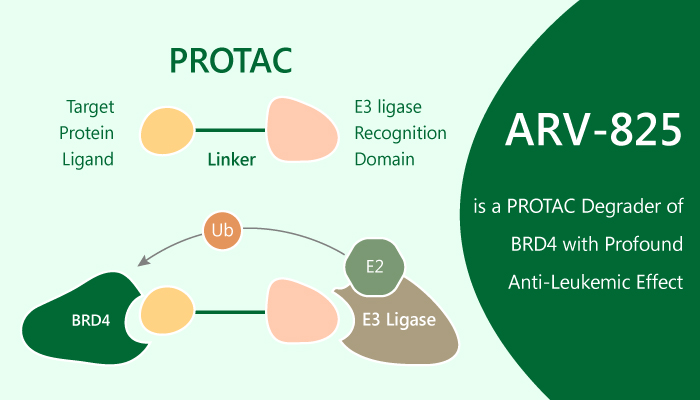BRD4 (Bromodomain-containing protein 4) belongs to the BET family, which also contains BRD2, BRD3, and BRDT. BRD4 has two bromodomains to recognize acetylated lysine residues. They are BD1 and BD2. It also contains an extended C-terminal domain. The latter interacts with P-TEFb and RNA polymerase II to promote gene transcription.
Translocation of BRD4 with NUT genes occurs in many NUT midline carcinomas. It is necessary to express Myc and other oncogenes in various hematologic cancers. Consequently, BRD4 has become a hot target for cancer research. BRD4 inhibitors have potential in cancer therapy.
So far, we have discovered many different kinds of BRD4 inhibitors. Among them, PTOTAC is a potent inhibitor. Herein, we are going to talk about a potent PTOTAC, ARV-825 as a BRD4 degrader.
ARV-825 recruits BRD4 binding moiety (OTX015) to an E3 ligase cereblon binding moiety with a linker. It degrades BRD4 rapidly and efficiently.

In detail, ARV-825 has a high affinity to BD1 and BD2 of BRD4, with Kds of 90 and 28 nM, respectively. It completely degrades BRD4 in BL cells, with DC50 of <1 nM. Such inhibition is cereblon-mediated and proteasome-dependent.
Moreover, ARV-825 significantly and long-lastingly downregulates c-MYC. ARV-825 also suppresses the downstream target gene SLC19A1, and the suppression is longer than that of small compounds.
Meanwhile, ARV-825 inhibits the proliferation of BL cells. ARV-825 (0.1 µM) exhibits a significant inhibitory effect on BL cells after treatment for 24 hours. It dramatically induces apoptosis at the same concentration. These inhibitory effects are more potent than small molecule inhibitors.
References:
1. Lu J, et al. Chem Biol. 2015 Jun 18;22(6):755-63.